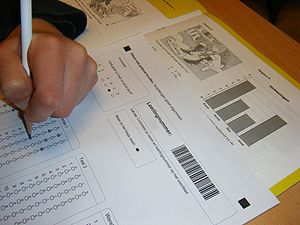All night my mind has been spinning after watching this video posted first by Alfie Kohn and then discussed by Larry Ferlazzo. You see, my district just started using MAP testing this year so the conversation shown makes me wonder if I will be that teacher having that conversation. I wonder whether I will have to share a student's weakness with them to get them to score higher, achieve more, and I shudder at the thought.
MAP testing provides a nifty number, hopefully one above 200 and also above whatever number I have been told the student should score above. And that to me is once again part of the problem; it is a number. An arbitrary number at best that changes when a student has a bad day, doesn't concentrate or simply does not take this formal assessment seriously. This is evident in the video when the teacher asks the students what they think happened since their score went down. But even more so, that number is just a number, sure it breaks down into percentiles so I can compare my students locally and nationally. And yes, it breaks down into strands, but what in the world does that all mean? What does that number tell me that i can bring back into the classroom and teach those kids better?
Unfortunately having moved to MAP testing means I am no longer expected to assess my students face-to-face who score above a certain Rigby level, the MAP testing does the job for me, so no sub time is given to do so. And yet, those assessment conversations are the conversations we need to have. Those conversations are what should be shaping my teaching because I can weed out whether a student is simply having a bad day, whether there is confusion in the directions, or whether it is a true assessment that can be used to set goas. Apparently, though, a computer can do this better than I can. The computer is more efficient than me and apparently more trustworthy in its assessment. And yet I squeeze in the face-to-face assessments when I can, sub or not sub, because I need to hear my students read, I need to hear them discuss questions, I need to watch them problem solve in math. If I don't see those things, I am not able to teach them well.
So I still meet with my students; not to discuss their weaknesses as is favored in the video but rather highlight what they are secure in and where they are developing. Language matters. I don't sugarcoat the truth but I do choose my words carefully. I use the data as yet another piece of data but wonder why we are so data-obsessed in the first place? Why don't we just use the data we have already in a better way? Why the need for more numbers to crunch, more numbers to graph? Is that all students should be reduced to; numbers? I don't know what MAP testing will do to my teaching next year, I will have to withhold my judgment, but after watching the video, I am scared.
MAP testing provides a nifty number, hopefully one above 200 and also above whatever number I have been told the student should score above. And that to me is once again part of the problem; it is a number. An arbitrary number at best that changes when a student has a bad day, doesn't concentrate or simply does not take this formal assessment seriously. This is evident in the video when the teacher asks the students what they think happened since their score went down. But even more so, that number is just a number, sure it breaks down into percentiles so I can compare my students locally and nationally. And yes, it breaks down into strands, but what in the world does that all mean? What does that number tell me that i can bring back into the classroom and teach those kids better?
Unfortunately having moved to MAP testing means I am no longer expected to assess my students face-to-face who score above a certain Rigby level, the MAP testing does the job for me, so no sub time is given to do so. And yet, those assessment conversations are the conversations we need to have. Those conversations are what should be shaping my teaching because I can weed out whether a student is simply having a bad day, whether there is confusion in the directions, or whether it is a true assessment that can be used to set goas. Apparently, though, a computer can do this better than I can. The computer is more efficient than me and apparently more trustworthy in its assessment. And yet I squeeze in the face-to-face assessments when I can, sub or not sub, because I need to hear my students read, I need to hear them discuss questions, I need to watch them problem solve in math. If I don't see those things, I am not able to teach them well.
So I still meet with my students; not to discuss their weaknesses as is favored in the video but rather highlight what they are secure in and where they are developing. Language matters. I don't sugarcoat the truth but I do choose my words carefully. I use the data as yet another piece of data but wonder why we are so data-obsessed in the first place? Why don't we just use the data we have already in a better way? Why the need for more numbers to crunch, more numbers to graph? Is that all students should be reduced to; numbers? I don't know what MAP testing will do to my teaching next year, I will have to withhold my judgment, but after watching the video, I am scared.






